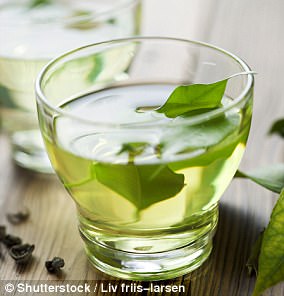Scientists have compiled a definitive list of foods proven to combat the symptoms of the crippling condition.
Ginger, blueberries, olive oil and green tea are among the ‘superfoods’ that help fight rheumatoid arthritis, according to new research. They suggest sufferers incorporate the foods into their diet to slow down the progressive, debilitating autoimmune disease.
Other foods listed as having an anti-inflammatory effect range from fruits – such as dried plums, grapefruit and pomegranates – to whole grains, the spice turmeric, as well as specific oils such as fish oil.
The experts – following their review of scientific research papers – also recommended switching from a meat diet to a plant-based one.
They said such foods reduce joint stiffness and pain by lowering inflammatory chemicals released by the immune system called cytokines. Scientists have compiled a definitive list of foods proven to combat the symptoms and slow down the progression of rheumatoid arthritis (stock photo).
The foods also lower oxidative stress – the ability of the body to counteract or detoxify harmful chemicals.
The team also advise taking probiotics and quitting alcohol and smoking. There’s no cure for rheumatoid arthritis, which causes pain, swelling and stiffness in the joints, severely impacting quality of life.
Study author Dr Bhawna Gupta, from KIIT University in India, said: ‘Regular consumption of specific dietary fibres, vegetables, fruits and spices, as well as the elimination of components that cause inflammation and damage, can help patients to manage the effects of rheumatoid arthritis.
‘Incorporating probiotics into the diet can also reduce the progression and symptoms of this disease.
‘Patients suffering from rheumatoid arthritis should switch from omnivorous diets, drinking alcohol and smoking to Mediterranean, vegan, elemental or elimination diets, as advised by their doctor or dietician.’
THE ANTI-INFLAMMATORY FOODS TO HELP BEAT ARTHRITIS
Green tea is said to reduce inflammatory cytokine levels.

FRUITS
Dried plums, grapefruit, grapes, blueberries, pomegranate, mango, bananas, peaches and apples.
WHOLE GRAINS AND CEREALS
Wheat, rice, oats, corn, rye, barley, millets, sorghum and canary seed.
OILS
Olive oil, fish oil, borage seed oil (capsules).
Ginger and olive oil reduce joint tenderness, stiffness and pain, research suggests.
DAIRY
Yoghurt (curd).
LEGUMES
Black soybean, black gram.
HERBS
Sallaki (boswellia serrata), ashwagandha (withania somnifera).
SPICES
Ginger, turmeric.
TEA
Green tea and basil (tulsi) tea.
Early treatment crucial. Experts say that It’s difficult to detect the early onset of the disease and, if undetected or misdiagnosed, has a rapid rate of progression in the first few years.
The first line of treatment includes disease-modifying anti-rheumatic drugs, but they can be expensive.
Dr Gupta said: ‘Supporting disease management through food and diet does not pose any harmful side effects and is relatively cheap and easy.
‘Doctors, physicians and dieticians can use our study to summarise current proven knowledge on the links between certain foods and rheumatoid arthritis.
‘Knowing the nutritional and medicinal requirements of their patients they can then tailor this information for the betterment of their health.’
Proven long-term effect
Various dietary plans for rheumatoid arthritis – such as vegan, seven to 10 days fasting and Mediterranean – have long been recommended.
But the research team said their new study – only the second overall assessment of diet and food regarding the disease – provides a thorough evaluation of current scientific knowledge and makes a point of only reporting dietary interventions and specific foods that clearly show proven long-term effects.
They hope the study, published in the journal Frontiers in Nutrition, can also be used as a reference for the development of new medicines.
Dr Gupta said: ‘Our review focused on specific dietary components and phytochemicals from foods that have a proven beneficial effect on rheumatoid arthritis.
‘Pharmaceutical companies may use this information to formulate ‘nutraceuticals’.
‘Nutraceuticals have an advantage over chemically-tailored medicines as they are not associated with any side effects, originate from natural sources and are cheaper.’
Dr Gupta added: ‘We reviewed research from several laboratory experiments under different conditions.
‘Dietary components vary according to geography and weather conditions, so patients should be aware of their nutritional requirements, allergies and any other food-related disease history.
‘We strongly suggest the general public consult doctors and dieticians before following any diet program or food compounds discussed in the study.



